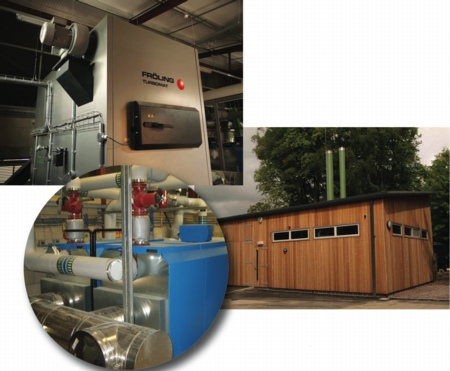Royal Agricultural College turns to biomass to reduce CO2 emissions
When the Royal Agricultural college was looking to reduce carbon emissions associated with oil-fired boiler plant what else could it do but look at biomass?
The principal thrust of the boiler industry over the last 30 years, according to Mike Southall, director of business development with Buderus in the UK, has been to improve efficiency and reduce emissions. Fossil-fuelled boilers burning gas and oil are now very close to 100% efficiency, based on gross calorific value. That figure should not to be confused with the rather vague ‘net’ calorific value that has found its way into the UK from Europe and which can give efficiencies up to about 110%.
Even so, you cannot get away from the fact that CO2 emissions from gas-fired boiler are approaching 0.2 kg/kWh of output and 0.3 kg/kWh for oil (figures from the Carbon Trust).
With traditional technology reaching its limits, boiler companies have been looking at other technologies such as biomass using wood pellets and wood chips. Carbon Trust figures suggest an 80% reduction in CO2 emissions compared with gas, down to less than 0.04 kg/kWh and even more compared with oil.
While biomass technology is very attractive to boiler companies looking to maintain their market, other companies have got there first and built up a wealth of installation experience.
One example is Econergy. This company was founded in 1999 and has experience with over 500 projects from 10 to 2 MW. Managing director Chris Miles tells us that the company’s standing received a substantial boost in 2009 which it became 19% owned by British Gas, helping to removing people’s natural caution in dealing with a relatively small contractor.
Now Buderus and Econergy have formed an alliance to deliver low-carbon boiler systems based on biomass with support and standby from fossil-fuel boilers.
Mike Southall explains, ‘In most biomass installations, there are also gas- or oil-fired boilers, and we have worked closely to design systems so that our products will work perfectly together.’
Chris Miles, says, ‘Commercial-scale biomass boilers are recognised by the Department of Energy & Climate Change as one of the most cost-effective technologies to deliver renewable heat. Working alongside Buderus is certain to enhance our reputation in the market place and allows both companies to offer the highest-quality complete biomass system solutions to commercial customers.’
One of the first projects by the alliance was the campus of the Royal Agricultural College, where existing oil-fired plant was replaced by a biomass boiler in a central plant room with heat distributed via a new underground district-heating network based on pre-insulated plastic heat mains.
Mains gas was considered, but the cost of bringing it to a site that did not already have a supply would have been prohibitive.
Heat pumps were also considered but rejected because of the age of the buildings and their heating systems, which require high flow and return temperatures for effective operation.
The installation comprises a 500 kW Fröling Turbomat boiler supported by two Buderus oil-fired boilers, each with an output of 295 kW, to provide standby capacity and support at very cold times of the year.

Fuel is stored in an underground bunker with a capacity of 50 m3. It has a self-lifting lid, so a tipper lorry can unload 30 m3 of wood chips very quickly. The wood chips are delivered to the boiler via an auger on a rotary arm.
The boiler is expected to use about 300 t a year of locally sourced seasoned wood chip to deliver about 850 MWh of heat. During the heating season, one 30 m3 delivery will be required each week. CO2 emissions will be reduced by 230 t a year.
The Royal Agricultural College pays for its wood chip according to energy used. That approach places the onus on the supplier to deliver good-quality fuel without excessive bark, sap or moisture content.
Oil for the two oil-fired boilers is stored in two 5000 l tanks and would be sufficient for two weeks if required.
A thermal buffer is provided by two 700 l vessels storing water at 90°C. Water from the buffer is delivered to the buildings at a flow temperature of 80°C and a return of 60°C. The boiler itself operates with a ∆T of 25K. The boiler can modulate down to 30% of full output, which in conjunction with the thermal store minimises on-off cycling and the inefficiencies that would be associated with a boiler having a large thermal mass.
The system meets only the requirements for space-heating , not domestic hot water — there being little requirement for DHW in the buildings served. Being a heating-only system, it is possible to modulate the supply temperature from the boilerhouse to reduce heat loss from the district-heating pipework when appropriate.
Heating systems in the various buildings are connected to the network by what Econergy calls a ‘virtual boiler’ — essentially a low-loss header.
The biomass boiler achieves an efficiency of 90% at full load and is expected to meet at least 95% of the actual heat demand.
The Royal Agricultural College funded the installation, with the support of a South West Bio-energy capital grant scheme.
Already the system is being extended, with the addition of more district-heating pipes to serve a new accommodation block.








